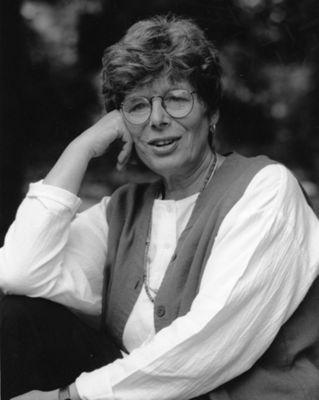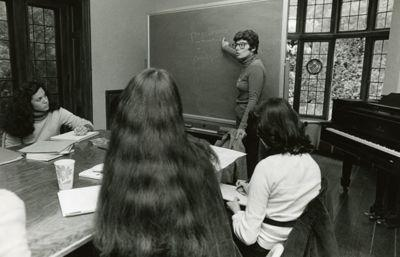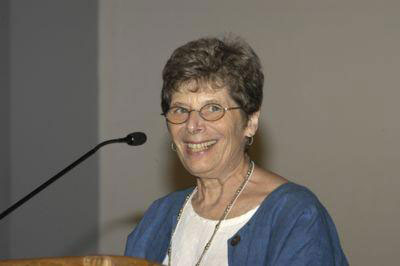Filed under:
 The Sarah Lawrence community mourns the loss of faculty emerita Margery Franklin, who passed away on October 26, 2025. A member of the Psychology faculty for 37 years (1965-2002), Margery taught and inspired generations of undergraduate and graduate students and played a pivotal role in shaping the College’s enduring focus and expertise in the areas of children, childhood, and education.
The Sarah Lawrence community mourns the loss of faculty emerita Margery Franklin, who passed away on October 26, 2025. A member of the Psychology faculty for 37 years (1965-2002), Margery taught and inspired generations of undergraduate and graduate students and played a pivotal role in shaping the College’s enduring focus and expertise in the areas of children, childhood, and education.
Margery’s scholarly interests were broad and often interdisciplinary. Three of her research papers illustrate her breadth. One classic study brought together her interests in language and pretend play, showing the different kinds of speech that are involved in children’s creation of imaginary worlds. Another, a collaborative study with Robert Becklen and Charlotte Doyle (Psychology, Child Development), drew on her passion for both language and the arts. That paper, “The influence of titles on how paintings are seen,” has continued to be cited over 30 years after it was written by arts journals as well as by those in psychology. Her combined interests in development and the arts took another form in her research study on visual artists’ journeys, tracing their development from childhood to transitions and changes in their mature work. Again with Charlotte Doyle, Margery designed a course in the psychology of experience, which drew on psychology, philosophy, sociology, and works of fiction. She and faculty member Jan Drucker created a course on Symbolic Processes, which explored cognitive and affective aspects of symbolizing.
 Margery was innovative and collaborative in program development. In 1971, she founded the College’s Child Development graduate program, creating a curriculum that explores the lives of children as the interaction of intellectual, emotional, social, and imaginative streams. In 2003, the College began offering a new dual degree program in Child Development and Social Work, which Margery had designed with the NYU Silver School of Social Work. This program today still offers graduate students the opportunity to become licensed clinical social workers with expertise in the development of children.
Margery was innovative and collaborative in program development. In 1971, she founded the College’s Child Development graduate program, creating a curriculum that explores the lives of children as the interaction of intellectual, emotional, social, and imaginative streams. In 2003, the College began offering a new dual degree program in Child Development and Social Work, which Margery had designed with the NYU Silver School of Social Work. This program today still offers graduate students the opportunity to become licensed clinical social workers with expertise in the development of children.
Along with her colleagues Jan Drucker and Sara Wilford, Margery co-founded the Child Development Institute (CDI) in 1987 to develop programs for early childhood and elementary school teachers, administrators, child development professionals, parents, and the community at large. Together with other members of the Child Development Institute, Margery was instrumental in collaborating with filmmaker Jonathan Diamond to produce The Learning Child Series (When a Child Pretends, When Learning Comes Naturally, Values Go to School, From Pictures to Words) for public television. After her retirement, Margery continued to share her expertise as a member of CDI’s faculty advisory group.
 Barbara Schecter, a longtime student and then colleague of Margery’s, reflected on her legacy for progressive education at Sarah Lawrence. Having grown up immersed in this tradition (at the City and Country School, as well as Bank Street), Margery went on to elegantly articulate this ideology of education (as she called it). In 2004, Margery gave a talk to the faculty titled, “Historical Roots and Basic Assumptions of an SLC Education”, in which she presented the core principles of the College as they are still carried out today and which have transformed the lives of students over many decades. President Cristle Collins Judd recently quoted from this document, and Associate Dean Ceci Toro wove words from it into her welcome and orientation for new faculty. In these many ways, Margery’s influence on the College and her reflections on its distinctive model of education continue to live on.
Barbara Schecter, a longtime student and then colleague of Margery’s, reflected on her legacy for progressive education at Sarah Lawrence. Having grown up immersed in this tradition (at the City and Country School, as well as Bank Street), Margery went on to elegantly articulate this ideology of education (as she called it). In 2004, Margery gave a talk to the faculty titled, “Historical Roots and Basic Assumptions of an SLC Education”, in which she presented the core principles of the College as they are still carried out today and which have transformed the lives of students over many decades. President Cristle Collins Judd recently quoted from this document, and Associate Dean Ceci Toro wove words from it into her welcome and orientation for new faculty. In these many ways, Margery’s influence on the College and her reflections on its distinctive model of education continue to live on.
In sum, Margery Franklin was a legendary teacher, an exemplary don, a strong voice in the faculty with a deep understanding of our pedagogy, a program innovator, an original researcher in the areas of play and artistic development, a generous collaborator, and a creative theorist — contributions that continue to enrich us.
Written by Barbara Schecter and Charlotte Doyle